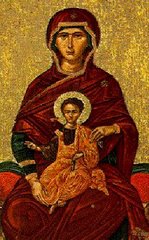1. He was a teacher of great repute in ancient Greece. His most well known pupil is the philosopher Plato.
2. He rejected the belief in the ancient Greek pantheon of gods and embraced the rational world of ideas as the true Reality.
Socrates was charged with atheism and corruption of the youth of Athens. For these he was sentenced to death, and a self-inflicted one no less, as he had to drink hemlock - a fatal poison.
Plato, in his monumental work, the Republic (Book VIII) uses an allegory (a story with a symbolic, deeper meaning) to illustrate the role of Socrates in Athenian society.
First, imagine a cave lit only by fire. In the cave is a chair where one (or several) people are chained perpetually (always) facing the cave wall. Behind them stands another wall and a platform or stage upon which other people may stand. The fire is still farther back, behind the stage.
 People may enter the stage unnoticed and hold up any number of objects above the wall, thus casting shadows on the cave wall for the captives to see. These shadows of objects are the only reality that these captives are able to envision.
People may enter the stage unnoticed and hold up any number of objects above the wall, thus casting shadows on the cave wall for the captives to see. These shadows of objects are the only reality that these captives are able to envision.An outsider, the Liberator, enters the cave and unchains the captives, leading them out of the cave to freedom. However, having no knowledge of the outside world the newly freed captives are anxious, nervous, frightened, angry, even in a state of denial. The bright sun hurts their eyes accustomed only to dim reflections of firelight. The real world blasts them with a spectrum of colors they never imagined existed. They have two options:
1. Learn to adapt to this new "real world". This will be a challenge that may require changing one's perception of reality, personal beliefs, and thought process.
2. Reject this new knowledge as some sort of hoax. Kill the "liberator" and retreat to the comfort of one's former life.
Plato sees Socrates as the Liberator and the Athenians chose option number two. Plato, however, chose option number one and is now destined to fulfill the role of liberator.
Other figures in history have fufliled this "Liberator" role, both figuratively and literally. For example, Moses had to not only challenge the authority of the pharaoh, but he also had to convince his own people that the uncertainty leaving slavery in Egypt would be better than the stability of staying.
Many scientists, explorers, discoverors, and inventors have filled the shoes of liberator as well. So too has our Lord, Jesus Christ. He brought us True Light and because we found the light different and challenging we chose to put him to death. Thanks be to God, the saving Love of Christ is more powerful than death.
Just so you know, this is not the first time you have come across the Allegory of the Cave; if you've ever seen the movie, The Truman Show, in which Jim Carrey's entire life is a farce created for the entertainment of others, then you've been exposed to the allegory. Perhaps the best example, however, is the Matrix Trilogy, in which Neo is broken free from the chains that bound him (and others) to the shadow existence and brought him into the uncomfortable "real" world. He had two choices, the red pill or the blue pill - accept the truth or reject it. You too are given this same choice.
It is no coincidence, then that Fr. Jonathan Meyer, vocations director for the Archdiocese, chose the character Neo as a model for his poster encouraging young men to consider the priesthood. It is not a comfortable path, nor is it one that many take. But it's rewards are real and it brings you face to face with Truth.

 The great irony of this ancient allegory is that in the last 50 years or so it has played itself out on a daily basis in homes throughout the western world. Day after day we voluntarily seat ourselves on chairs - chains to hold us are not necessary - and we watch shadows flicker on the wall in front of us (called a television). We see mere images of the real world, rather than the world itself. Liberate yourself and live life deliberately. Don't sit in a cave and settle for shadows of the real thing.
The great irony of this ancient allegory is that in the last 50 years or so it has played itself out on a daily basis in homes throughout the western world. Day after day we voluntarily seat ourselves on chairs - chains to hold us are not necessary - and we watch shadows flicker on the wall in front of us (called a television). We see mere images of the real world, rather than the world itself. Liberate yourself and live life deliberately. Don't sit in a cave and settle for shadows of the real thing. Is not the dreamer, sleeping or waking, one who substitues artificial things, who puts the copy in place of the real object?.
Is not the dreamer, sleeping or waking, one who substitues artificial things, who puts the copy in place of the real object?.-- Plato
Like everyone else, you were born into bondage, kept inside a prison that you cannot smell, taste, or touch. A prison for your mind.
-- Morpheus
-- Morpheus

Until next time,
Ad Jesum Per Mariam,
Mr. B.


No comments:
Post a Comment